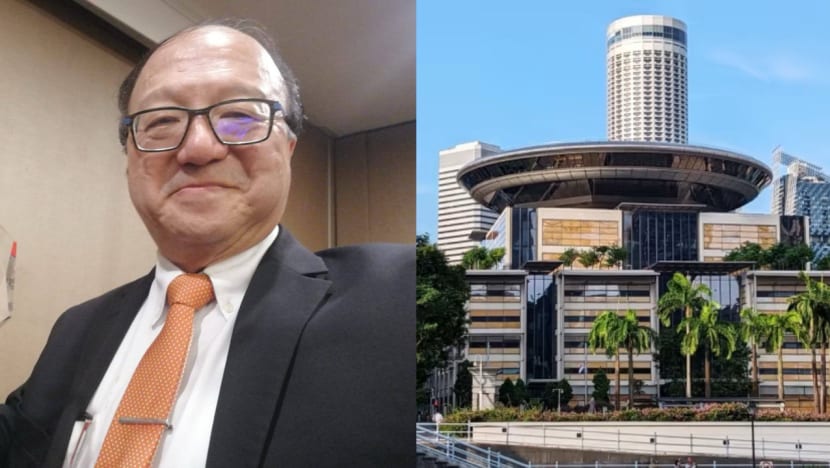Psychiatrist who prescribed medication beyond maximum dosage found guilty of professional misconduct
Dr Ang Yong Guan acknowledged that one of his prescriptions went to the “edge of the killing range”.

Dr Ang Yong Guan and the Supreme Court in Singapore. (File photos: Facebook/Ang Yong Guan, CNA/Try Sutrisno Foo)

This audio is generated by an AI tool.
SINGAPORE: A psychiatrist was found guilty of three counts of professional misconduct on Monday (May 13) for deviating from the relevant standards when prescribing various medications to a patient.
These include prescribing medication beyond the maximum dosages stated in the package inserts.
The case involving Dr Ang Yong Guan relates to a series of prescriptions for a patient named Quek Kiat Siong, who died four days after the last prescription was issued in 2012.
The cause of death was "multi-organ failure with pulmonary haemorrhage, due to mixed drug intoxication”.
The concentration of drugs in his blood was found to be "elevated beyond the therapeutic concentrations found in living subjects", court documents stated.
Mr Quek's sister filed a complaint against Dr Ang with the Singapore Medical Council (SMC) in 2017.
However, a disciplinary tribunal acquitted Dr Ang of professional misconduct and instead found him guilty of failing to provide professional services of the quality which is reasonably expected of him.
This was overturned on Monday by the Court of Three Judges, which said Dr Ang knew he had exceeded the applicable dosage limits and could not justify his decisions to deviate from the standards.
The court, comprising Chief Justice Sundaresh Menon, Justice Belinda Ang and Justice Tay Yong Kwang, will hear arguments at a later date on the appropriate sanctions to be meted out.
WHAT HAPPENED
Mr Quek first consulted with Dr Ang on Feb 8, 2010, after a referral from another doctor.
For about two years, Dr Ang, who is also a member of the Progress Singapore Party, treated Mr Quek for multiple conditions, including insomnia, depression, post-traumatic stress disorder and anxiety.
The patient had concurrent prescriptions of multiple benzodiazepines, concurrent prescription of benzodiazepines with opioid analgesics, as well as excessive dosages of Mirtazapine and Zolpidem Controlled Release.
Benzodiazepines are depressants that relieve anxiety. Mirtazapine is used to treat symptoms of depression, while Zolpidem is prescribed for insomnia.
One of the three charges relates to the final prescription issued on Jul 31, 2012.
It was for a daily dose of 60mg of Mirtazapine, which exceeded the permitted maximum daily dosage of 45mg, as well as a daily dose of 25mg of Zolpidem Controlled Release. This was above the permitted maximum daily dosage of 12.5mg.
Mr Quek died four days later.
JUDGMENT
Dr Ang acknowledged that his prescription of 60mg of Mirtazapine per night went to the “edge of the killing range”, but he did not explain why he thought the risks to the patient were worth taking.
"The benefits of his prescription must outweigh or justify the risks taken on, and Dr Ang has not explained why this was so in this case," said the Court of Three Judges.
They added in the judgment that while prescriptions of Mirtazapine or Zolpidem Controlled Release in dosages beyond their stipulated maximums posed little risk when taken alone, it had to be noted that the patient was also concurrently taking a variety of other medications.
The two other charges relate to prescriptions issued between Feb 8, 2010, and Dec 31, 2011; and between Jan 1, 2012 and Jul 31, 2012.
Dr Ang's decision to switch between antidepressants without ensuring that each was continued for at least four to six weeks was inconsistent with guidelines issued by the Ministry of Health.
He had also gone against guidelines on the long-term chronic use of benzodiazepines by prescribing a six-month supply to the patient.
The court found that some of his decisions to depart from the guidelines were "objectively defensible" while others were not.
In its judgment, the court said that while doctors may depart from standards adopted by the medical profession, the burden falls on them to show that their decisions are objectively justified in terms of the risks and benefits.
The SMC's disciplinary tribunal had declined to convict Dr Ang on charges of professional misconduct, concluding that his decisions did not amount to an intentional and deliberate departure from the standards of treatment.
It pointed out that the psychiatrist had shown “care and concern” for Mr Quek and “attempted to meet the standard” expected of him.
But the Court of Three Judges ruled that "care and concern” for a patient were irrelevant to an inquiry for professional misconduct.














